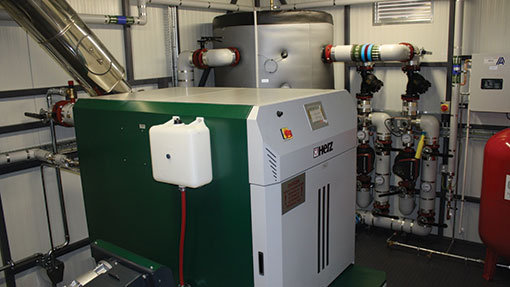Funded-biomass boiler scheme offers cheaper heat on-farm

Halving fuel costs by replacing conventional oil or gas-powered heating with biomass is undoubtedly an attractive proposition, but the capital cost required for such technology can be a major hurdle for many farm businesses.
However, schemes are being developed which put boilers on farms which then benefit from cheaper heat without the capital outlay of buying the boilers. In exchange for this, the Renewable Heat Incentive (RHI) payments are claimed by the developer or funder.
Renewable energy firm Lumicity is currently retrofitting 179 Austrian-made Herz Energietechnik boilers, ranging in size from 151kW to 199kW, on 21 Bernard Matthews turkey farms in Norfolk, Suffolk and Lincolnshire, providing heat for 248 poultry sheds.
The scheme is part of a drive by the turkey giant to source all energy from sustainable sources over the next couple of years and it is hoped that other farm businesses could also benefit from the funded biomass concept in the future.
“We’re already generating a large proportion of our energy needs from other renewable sources, including solar and wind, and with the addition of biomass boilers on our farms, we’re well placed to be generating 100% of our energy sustainably by 2016,” says Bernard Matthews executive chairman David Joll.
How it works
Funding worth £24.5m has been secured for the project from the UK Green Investment Bank’s Energy Saving Investments fund, which is managed by Equitix. The money is being used to identify potential sites, design, build and maintain the boilers, with Lumicity leasing land next to the turkey sheds on which they are placed.
Equitix retains ownership of the assets throughout and also receives all Renewable Heat Incentive (RHI) income for the length of the scheme (20 years).
While farmers never own the boiler or receive any RHI income, Lumicity chief executive Tristan Fischer says they can expect to save 25-50% on heating bills by buying woodchip instead of liquefied petroleum gas (LPG), with no upfront capital cost for installing a boiler. For Bernard Matthews, the total annual fuel bill on these 21 farms is expected to be cut from £3.3m to £1.7m.
A peppercorn rent is paid to the farmer for the lease of the land where the boiler is installed while Lumicity provides an operations and maintenance contract on the boiler over its lifetime so only minimal maintenance is required (for example, emptying ash) on the farmer’s part. Plus it promises significant CO2 savings and some animal welfare benefits from the “dry heat” system (see box).
Discussions are under way to expand the biomass heating programme to the remainder of Bernard Matthews’ 51 turkey farms, and Mr Fischer says the concept could easily work on other farms and with other technology types, such as solar.
“Whether it’s one shed or 1,000, we can provide a fully funded, bespoke solution, helping farmers to finance the scheme over a number of years.
“In Bernard Matthews’ case, Lumicity built on economies of scale, but of course smaller farms could equally benefit from the financial and environmental advantages of this technology.”
What’s the catch?
The scheme requires farmers to sign up for a 20-year term, although there is a break clause after 10 years, the fee for exercising this is linked to value of the equipment at the time of breaking the agreement.
While farmers can source their own legally-compliant fuel suitable for the individual boiler, they must follow Lumicity’s specification for what should be used. In the case of Bernard Matthews’ farms, woodchip is the preferred fuel type, largely because it is cheaper than pellets. Total annual requirement is more than 15,400t, with a specification of G30 chip size and W30 moisture content (20-30%).
In the future, it is hoped that changes to the European Waste Incineration Directive will allow poultry litter to be burnt to further reduce bills and cut the cost of transporting litter for disposal.
Mr Fischer says the boilers do not increase fire risk and are actually lower risk than LPG because they are installed outside poultry sheds. Any fire risk is carried by the asset owner, who has third party liability insurance. In the case of this scheme, the asset owner is Equitix not Bernard Matthews or the farmer.
Welfare benefits
Lumicity says biomass heating systems can improve bird welfare in poultry sheds as the dry heat produced means humidity is cut from 65% under LPG systems to nearer 35%, and carbon monoxide emissions are also lower.
The firm says heat circulation is better than with LPG systems and there is reduced in-house ammonia, lower ventilation requirements and better litter quality.
These all improve bird health and result in a higher feed conversion ratio, creating an additional saving on feed costs, suggests Mr Fischer.
